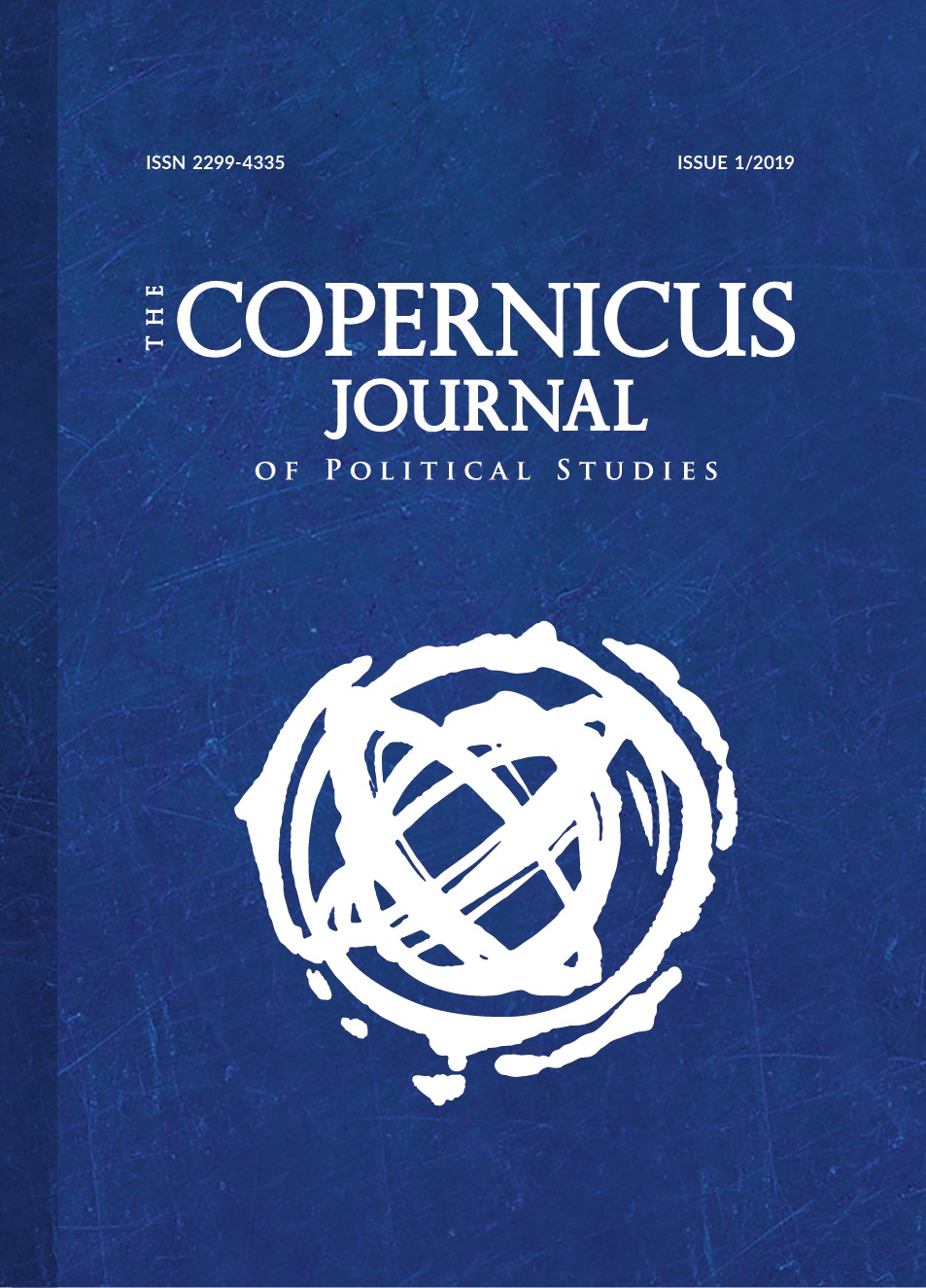The Collective Security Treaty Organization (CSTO) in the foreign policy of the Russian Federation
DOI:
https://doi.org/10.12775/CJPS.2019.008Słowa kluczowe
reintegration, post-Soviet area, CSTO, foreign policy, RussiaAbstrakt
Paradoxically, the process of reintegration of post-Soviet area has been taking place since the collapse of the USSR. The motive of Russia’s efforts to reintegrate this region is the historically driven belief in Moscow’s role as a leader in this part of the world, and the strong cultural, economic and political ties that connect it with the former Soviet republics. The former republics of the USSR also feel strong ties with Russia. In addition, the ruling elites feared the future after the collapse of the USSR, especially at the beginning of the formation of their independent statehood, which determined the decision to establish strong cooperation with Russia. Today, after nearly thirty years, the reintegration process still continues although its intensity and the number of countries involved have changed. One of its areas is the sphere of security, which is confirmed by the activity of the Collective Security Treaty Organization, where Russia plays a key role. In this context, the author attempted to answer the question: What role does the CSTO play in Russia’s foreign policy?
Bibliografia
Baluk, W. (2008). Wspólnota Niepodległych Państw – integracja czy dezintegracja?. In W. Baluk (Ed.), Polityka zagraniczna i bezpieczeństwa krajów Wspólnoty Niepodległych Państw (pp. 13–19). Wrocław: Arboretum.
Boulègue, M. (2017). Five Things to Know About the Zapad-2017 Military Exercise. Retrieved from https://www.chathamhouse.org/expert/comment/five-things-know-about-zapad-2017-military-exercise
Charter of the Collective Security Treaty Organization (2002). Retrieved from http://en.kremlin.ru/supplement/3506
Czaputowicz, J. (2008). Teorie stosunków międzynarodowych. Krytyka i systematyzacja. Warszawa: Wydawnictwo Naukowe PWN.
Douhan, A. F., & Rusakovich, A. V. (2016). Collective Security Treaty Organization and Contingency Planning after 2014. Retrieved from https://www.dcaf.ch/sites/default/files/publications/documents/CSTO_ContingencyPlanningAfter2014_eng.pdf
Haas, M de. (2017). Relations of Central Asia with the Shanghai Cooperation Organization and the Collective Security Treaty Organization. The Journal of Slavic Military Studies, 1, 1-16. Retrieved from https://www.tandfonline.com/doi/abs/10.1080/13518046.2017.1271642
Kaszuba, M. (2017). W uścisku Moskwy Obszar poradziecki. Warszawa: Oficyna Wydawnicza Rytm.
Kuźniar, R. (2000). Międzynarodowe stosunki polityczne. In E. Haliżak, R. Kuźniar (Ed.), Stosunki międzynarodowe – geneza, struktura, dynamika (pp. 119–141). Warszawa: Wydawnictwo Uniwersytetu Warszawskiego.
Lefebvre, S., & McDermott, R. N. (2008). Russia and the Intelligence Services of Central Asia. International Journal of Intelligence and Counter Intelligence, 2(21), 251–301.
Legucka, A. (2016). Wykorzystywanie quasi-państw w polityce zagranicznej Federacji Rosyjskiej. Rocznik Nauk Społecznych, nr 1, 8 (44), 11–29. Retrieved from https://www.researchgate.net/publication/312312088_Wykorzystanie_quasi-panstw_w_polityce_zagranicznej_Federacji_Rosyjskiej
Makarychev, M. (2011, 26 yanvarya). Nenadorugat’spetssluzhby. Gostem „RG” byl ispolnitel'nyy sekretar’ SNG Sergey Lebedev, Rossiyskaya gazeta.
Malak, K. (2008). Polityka Bezpieczeństwa Federacji Rosyjskiej na obszarze WNP. In W. Baluk (Ed.), Polityka zagraniczna i bezpieczeństwa krajów Wspólnoty Niepodległych Państw (pp. 23–40). Wrocław: Arboretum.
Minkina, M. (2012). Wywiad Federacji Rosyjskiej. Siedlce: Wydawnictwo Uniwersytetu Przyrodniczo-Humanistycznego.
Mowchan, J. A. (2009). The militarization of The Collective Security Treaty Organization, Center for Strategic Leadership – U.S. Army War College, 6-09, 1–6.
Nikitina, Y. (2013). Security cooperation in the Post-Soviet area within the Collective Security Treaty Organization. ISPI – Analysis, 152, 1-5. Retrieved from https://www.ispionline.it/it/documents/Analysis_152_2013.pdf
Strategiya kollektivnoy bezopasnosti Organizatsii Dogovora o kollektivnoy bezopasnosti na period do 2025 goda (2016). Retrieved from http://odkb-csto.org/documents/detail.php?ELEMENT_ID=8382
Strategiya natsional’noy bezopasnosti Rossiyskoy Federatsii do 2020 goda, Utverzhdena Ukazom Prezidenta Rossiyskoy Federatsii ot 12 maya 2009 g. № 537, http://www.scrf.gov.ru/documents/99.html
Vneshnyaya politika (2009). Spetssluzhby stran SNG soriyentirovany na plotnuyu sovmestnuyu rabotu po prioritetnym napravleniyam — glava SVR, ITAR-TASS, 4 sentyabrya.
Voyennaya Doktrina Rossiyskoy Federatsii (2010). Retrieved from http://kremlin.ru/supplement/461
Weinstein, A. (2007). Russian Phoenix: The Collective Security Treaty Organization. The Whitehead Journal of Diplomacy and International Relations, vol. Winter/Spring, 167-180. Retrieved from https://heinonline.org/HOL/LandingPage?handle=hein.journals/whith8&div=3&id=&page=
Weitz, R. (2014). The Collective Security Treaty Organization: Past Struggles and Future Prospects. Russian Analytical Digest, 152(2-4). Retrieved from http://www.css.ethz.ch/content/dam/ethz/special-interest/gess/cis/center-for-securities-studies/pdfs/RAD-152-2-4.pdf
Pobrania
Opublikowane
Jak cytować
Numer
Dział
Statystyki
Liczba wyświetleń i pobrań: 948
Liczba cytowań: 0



